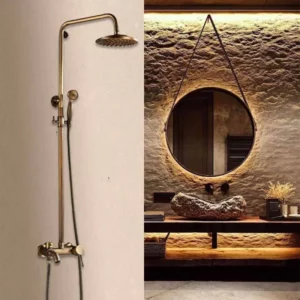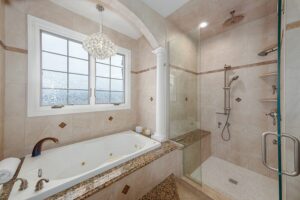Purchasing wholesale shower fixtures can strain your budget if not managed well. High costs, delayed deliveries, and subpar products are common challenges. Effective cost-saving strategies are essential to secure high-quality fixtures at competitive prices, keeping your projects on track and within budget.
To save money when purchasing wholesale shower fixtures, focus on bulk buying, negotiate better deals with suppliers, opt for direct manufacturer purchases, ensure quality to reduce replacements, and take advantage of seasonal discounts and promotions.
Saving money on wholesale shower fixtures requires a strategic approach that balances cost and quality.
What is the Difference Between Commercial and Residential Faucets?
Commercial plumbing products generally have thicker walls and heavier components compared to residential ones. They are designed to withstand more wear and tear, making them more durable and less likely to rust out or wear out over time. This durability is essential in commercial settings where fixtures are subject to frequent and heavy use. For example, a commercial faucet in a busy restaurant or hotel must endure constant operation without failing, which necessitates robust construction and high-quality materials.
While many residential fittings are plastic-made, most commercial ones use metal parts for extra strength. Plastic components, though cost-effective, are more prone to damage and wear over time. In contrast, metal parts offer superior durability and longevity, which is why they are preferred for commercial applications. Additionally, commercial faucets often feature vandal-resistant designs and finishes that can withstand rough handling and frequent cleaning with harsh chemicals. These attributes make commercial faucets a better investment for high-traffic areas, even if they come with a higher upfront cost.
Choosing between commercial and residential faucets depends on the specific needs of your project. If you anticipate heavy usage and require fixtures that can handle the demands of a commercial environment, investing in commercial-grade products is the best choice. These products, though initially more expensive, offer greater reliability and lower long-term maintenance costs. On the other hand, for residential applications where the usage is moderate, residential-grade faucets can provide sufficient performance at a lower cost.
What is the Difference Between Plumbing Fittings and Plumbing Fixtures?
A bathroom fixture is a permanent feature of your bathroom, such as bathtubs and toilets, that is plumbed or wired in. These are not easily or freely moved without renovation work. Fixtures are integral to the bathroom’s infrastructure and typically require professional installation. Examples include sinks, toilets, and showers. These elements are essential for the bathroom’s functionality and are usually designed to last for many years with proper care and maintenance.
On the other hand, bathroom fittings are elements you include in your bathroom in addition to permanent fixtures, such as showerheads and faucets. Fittings are often easier to replace or upgrade and can be swapped out without major renovations. They provide flexibility in terms of style and functionality, allowing you to update your bathroom’s appearance and performance without significant expense. For instance, upgrading to a new, water-efficient showerhead can improve your bathroom’s functionality and reduce water consumption, contributing to overall cost savings.
Understanding this difference helps in planning purchases and installations effectively, ensuring that you invest in the right components for your needs. Fixtures typically represent a larger investment and require careful selection to ensure they meet your long-term needs. In contrast, fittings offer an opportunity to enhance your bathroom’s functionality and aesthetics with relatively minor changes. When budgeting for a bathroom renovation or new construction, allocating funds appropriately between fixtures and fittings can help you achieve the best balance of quality, functionality, and cost-effectiveness.
Cost-Saving Strategies for Plumbing Fixtures
Bundling Purchases
By purchasing multiple selections or categories from one supplier, you can save an additional 3-7%, depending on the supplier.
Buying in Bulk
Larger quantities often come with discounts, significantly lowering the per-unit cost.
Negotiating Deals
Don’t hesitate to negotiate prices, especially if you’re placing a large order. Suppliers may offer better rates for long-term commitments or larger volumes.
Opting for Direct Manufacturer Purchases
Buying directly from manufacturers eliminates the middleman, leading to lower costs.
Utilizing Seasonal Discounts
Keep an eye out for promotions and discounts during off-peak seasons or special sales events.
Wholesale Shower Fixture Suppliers
Identifying reliable suppliers is key to successful cost-saving. Building long-term relationships with suppliers can result in better deals and more consistent quality. Establishing trust and open communication with suppliers enables you to negotiate more favorable terms and receive better service. Reliable suppliers are more likely to go the extra mile to meet your needs, whether it’s by offering customized products, providing faster delivery times, or assisting with technical support.
Leveraging trade shows and online platforms like Alibaba can help you find reputable suppliers. Trade shows offer the opportunity to meet suppliers face-to-face, see their products firsthand, and discuss your specific requirements in detail. Online platforms provide access to a wide range of suppliers and allow you to compare prices, read reviews, and communicate with potential partners. Utilizing these resources can expand your supplier network and help you find the best deals.
Always verify the credibility of suppliers and look for reviews or recommendations from industry peers. Conduct background checks to ensure that suppliers have a good financial standing and a history of reliable performance. Request references from other clients and follow up with them to gather feedback on their experiences. By thoroughly vetting suppliers, you can reduce the risk of encountering issues such as delayed deliveries, substandard products, or fraudulent practices.
Best Practices for Purchasing Plumbing Supplies
- Researching Suppliers: Conduct thorough research to identify reliable suppliers with good reputations.
- Verifying Credentials: Ensure that suppliers have the necessary certifications and comply with international standards.
- Inspecting Product Samples: Before making bulk purchases, request samples to verify quality.
- Ensuring Compliance: Make sure that all products meet the necessary regulations and standards for your specific market.
Implementing these cost-saving strategies will help you make the most of your budget while ensuring high-quality shower fixtures for your projects. Building strong relationships with reliable suppliers and staying informed about market trends are key to long-term success.




